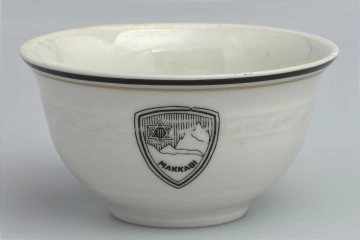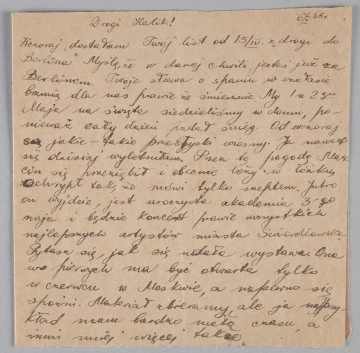
Vessel (container)
1930 — 1939
Museum of the history of Polish Jews
Digital documentation under development
Part of the collection: Enterprises and shops of Polish Jews before World War II
One of the popular jobs among Polish Jews was printing and bookbinding. Jews are commonly called the People of the Book. The term stems from the importance attributed to the written word and respect with which it is held in Judaism. Therefore, the tradition of Jewish printing dates back to the period when the invention of printing itself was made. The oldest Hebrew printing houses were established in Italy in the second half of the 15th century. The first Jewish printing house in Central Europe was founded in Prague in 1512, and the first Jewish printing house in what is now Poland is believed to have been established in 1530 in the Silesian town of Oleśnica. The Republic of Poland quickly became an important market for Jewish books. Between the 16th and 18th centuries, a total of over 2,000 publications in Hebrew appeared. The rapid development of industry, and thus the modernisation of printing techniques in the 19th century, proved to be a breakthrough in the field of printing, bringing an enormous increase in the number of publications in Hebrew and Yiddish. The Jewish press played a vital role in this (especially in the second half of the 19th and early 20th centuries). Thus, the 19th and 20th centuries saw a significant expansion of Jewish participation in the printing industry. There appeared Jewish publishers who published Polish books, including those who penetrated the world of Polish culture.
The bookbinding press in the POLIN Museum collection is a device used for binding books. The marking or decoration with a Star of David - a commonly recognised symbol of Judaism - suggests it was used in one of the Jewish printing houses or bookbinding workshops. Since a donor purchased the press at an antique market, it is not easy to reconstruct its history. The placement of the Star of David symbol in a visible part of the machine allows us to assume that the machine was used in one of the Warsaw printing houses. The symbol could have been painted over according to an order issued by the governor of the Warsaw district, Ludwig Fischer, on 24 November 1939. Based on the order, Jews were obliged to mark Jewish shops and workshops by placing the Star of David symbol, among other things, on their equipment.
The object was entirely made of cast iron and covered with black paint. The press consists of a long cylindrical stick attached to the base with two triangular plates (perpendicular to it), a screw with a handle placed in a hole in the middle of the stick, and two working plates placed horizontally (one above the other). One of the plates is also the base of the structure; the other plate is attached to the screw (at its end) by two small screws. The handle of the screw is also made of cast iron, its shape is cylindrical and elongated, and its position is horizontal, which makes it easy to turn the screw (pressing the object resting on the lower plate). The six-pointed star symbol can be seen in the hole where the screw is placed (on both sides of the device). The symbol was made with gold coloured paint. The top plate is additionally decorated with a straight line in the same colour. The line runs along each edge about 2 cm from the edge. The press was donated to the Museum by Jerzy Diatłowicki.
Marta Frączkiewicz
Author / creator
Dimensions
cały obiekt: height: 22,5 cm, width: 31 cm
Technique
Casting, joining, painting
Material
Metal, paint
Creation time / dating
Creation / finding place
Owner
POLIN Museum of the History of Polish Jews
Identification number
Location / status

Porcelain Manufactory Ćmielów (Ćmielów; 1804- )
1930 — 1939
Museum of the history of Polish Jews

Klitenik, Grania
ca 1941
Museum of the history of Polish Jews

Ratz, Emilia
1945
Museum of the history of Polish Jews
DISCOVER this TOPIC
Museum of King Jan III's Palace at Wilanów
DISCOVER this PATH
Educational path
0/500

We use cookies to make it easier for you to use our website and for statistical purposes. You can manage cookies by changing the settings of your web browser. More information in the Privacy Policy.
We use cookies to make it easier for you to use our website and for statistical purposes. You can manage cookies by changing the settings of your web browser. More information in the Privacy Policy.
Manage cookies:
This type of cookies is necessary for the website to function. You can change your browser settings to block them, but then the website will not work properly.
WYMAGANE
They are used to measure user engagement and generate statistics about the website to better understand how it is used. If you block this type of cookies, we will not be able to collect information about the use of the website and we will not be able to monitor its performance.